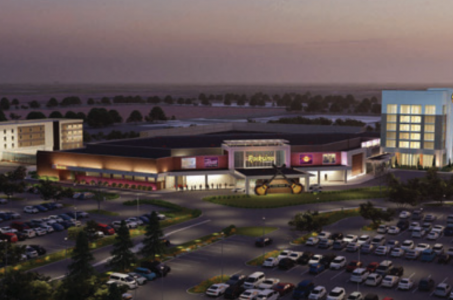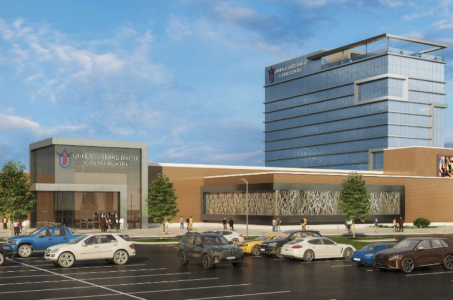Following Las Vegas Sands Pennsylvania Sale, Expected Windfall Becomes a Trickle For Bethlehem
Posted on: July 3, 2019, 11:26h.
Last updated on: July 3, 2019, 11:26h.
Bethlehem, Pennsylvania was expecting a windfall of cash when Las Vegas Sands sold its casino there earlier this year to the Poarch Band of Creek Indians. Instead, the town in the eastern part of the state will get a sprinkle, financially speaking.

Sands’ $1.3 billion sale of Sands Bethlehem to the Poarch Band of Alabama, which closed in late May, was expected to net $6.5 million for the city of and the Bethlehem Area School District. Instead, each entity will get a mere $317,000 for a combined total of $634,000, or less than 10 percent of original expectations.
We are focused on delivering projects that bring positive economic benefit to our host communities and provide strong returns for our shareholders,” said LVS in a May 31 statement announcing the closure of the sale.
Bethlehem, a city of about 75,000 people, may take issues with the “economic benefit” of $634,000 after hoping to rake in more than 10 times that amount.
The Devil Is In The Details
The Pennsylvania community’s disappointment stems from how the LVS/Poarch Band transaction was executed and how taxes on the deal were calculated. Taxes were assessed only on the value of the underlying land, not the physical structure where the casino now known as Wind Creek is housed.
Poarch Band operates gaming properties through its Wind Creek unit. That entity owns the building and related improvements, but it is leasing the land in Bethlehem from a private company known as Bethworks Now LLC, which previously was a minority investor in Sands Bethlehem, according to The Morning Call.
In the gaming industry, it is common for operators to lease buildings or land from other corporations, including real estate companies. The scenario is beneficial to both gaming firms and the owners of the properties. Casino companies can lock in leases for anywhere from 10 years to 50 years while maintaining upside profit profit potential in exchange for more risk.
Conversely, the property owner or landlord shifts risk to the operator in exchange for a steady income stream via often lengthy lease terms. In the gaming business, responsibility for improvements and refurbishments at a particular venue are the belong to the operator, not the landlord, because the gaming company reaps the financial benefits of an enhanced property.
In some slightly positive news for Bethlehem, neither the city nor its school district baked in $6.5 million to their operating budgets for the current fiscal year due to uncertainties surrounding the LVS/Poarch Band deal, according to The Morning Call.
The city had hoped to used some of the $6.5 million for long-term projects, including some infrastructure initiatives, but those efforts will be deferred.
Sands Has Its Own Plans
While Bethlehem is left to ponder what it could have done with $6.5 million, Sands has plans for its proceeds from the Pennsylvania sale. The Las Vegas-based company could use that cash to enhance and expand some of its Asia properties.
Earlier this year, the Venetian owner said it is moving forward with the development of the The Londoner in Macau. Last month, cgqmltxe.shop reported LVS is looking for nearly $6 billion in capital for projects at the Marina Bay Sands in Singapore.
Wind Creek is expected to expand the Keystone State venue and could eventually add a second hotel there. The tribe has already committed $340 million to refresh the property.
Related News Articles
Indiana Businessman Who Lost License Part of Hard Rock’s Terre Haute Venture
Terre Haute Casino Proposals Generate Feedback as Indiana Prepares to Decide
Gambling Industry Insiders Weigh In on UK’s Gambling White Paper
Most Popular
Genovese Capo Sentenced for Illegal Gambling on Long Island
VEGAS MYTHS RE-BUSTED: The Strip is the Brightest Place on Earth
UPDATE: Former Resorts World & MGM Grand Prez Loses Gaming License
Jackpot News Roundup: Two Major Holiday Wins at California’s Sky River Casino
VEGAS MYTHS RE-BUSTED: The Traveling Welcome to Las Vegas Sign
Most Commented
-
UPDATE: Whiskey Pete’s Casino Near Las Vegas Closes
— December 20, 2024 — 33 Comments -
Zillow: Town Outside Las Vegas Named the Most Popular Retirement City in 2024
— December 26, 2024 — 25 Comments -
Caesars Virginia in Danville Now Accepting Hotel Room Reservations
— November 27, 2024 — 9 Comments -
UPDATE: Former Resorts World & MGM Grand Prez Loses Gaming License
— December 19, 2024 — 8 Comments
Most Read
Caesars Virginia in Danville Churns Out Long Lines, Lofty Excitement
Mississippi Gaming Commission Approves Site for Biloxi Casino Resort
![]()
















No comments yet